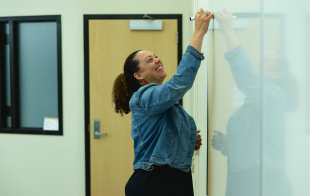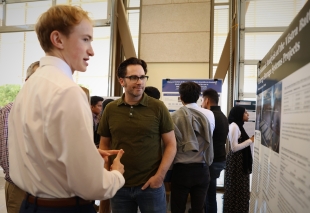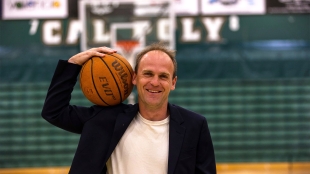Diving Into Her Work: Distinguished Teacher Kim Westermann
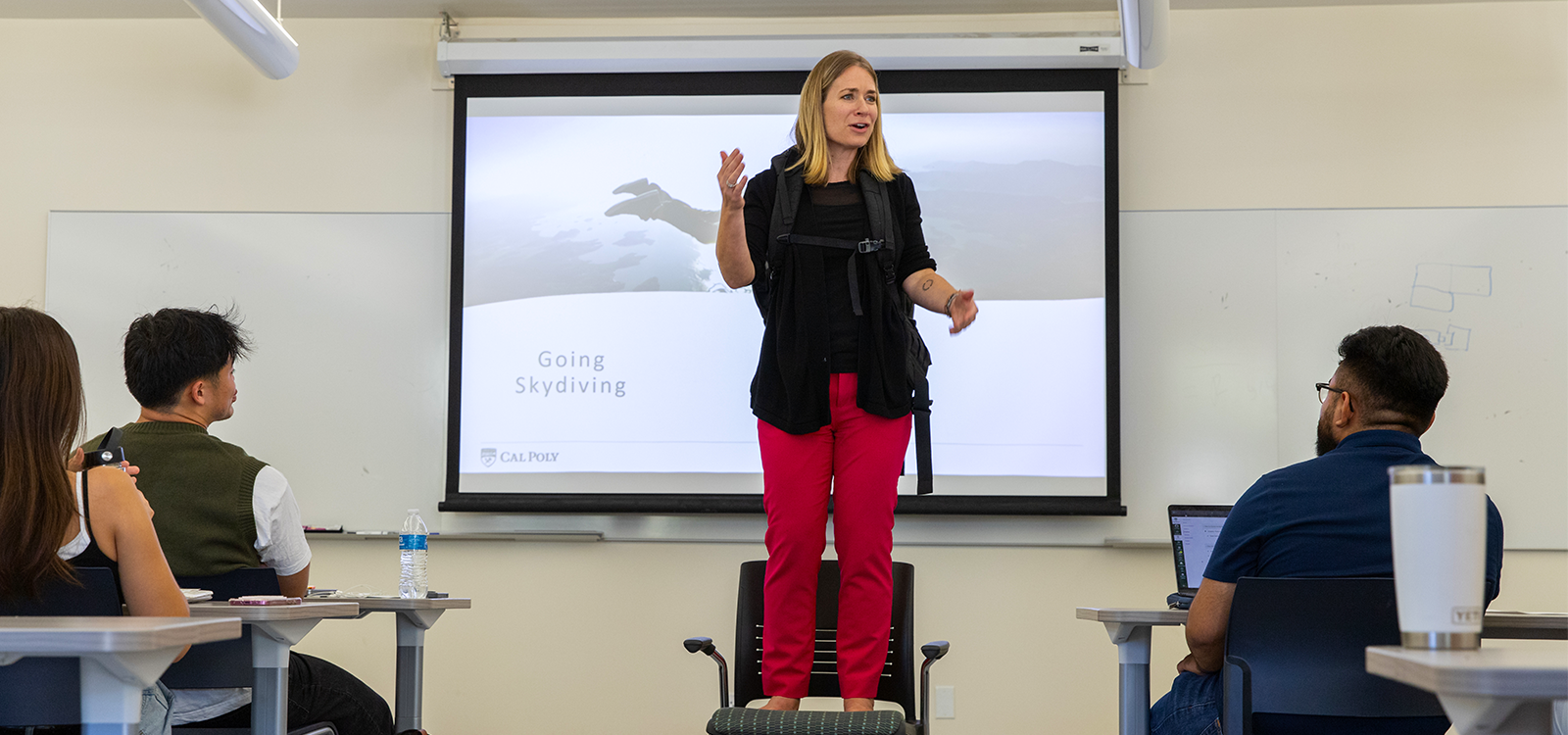
During the first meeting of her auditing class, accounting Professor Kim Westermann slips off her shoes, steps on a chair and takes her students “skydiving.”
Grasping the straps of her backpack, with a photo of a skydiver projected behind her, she describes a made-up scenario that might cause anxiety: For her birthday, her husband has surprised her with her first skydiving lesson – purchased at a significant discount.
“What am I worried about now?” she asks her students. “What are my risks?”
Skydiving certainly does entail risk, including injury and – worst case scenario -- death. But, she tells her class, risk can also be greatly minimized: Well-trained staff can use dependable parachutes and only jump on clear days, for example.
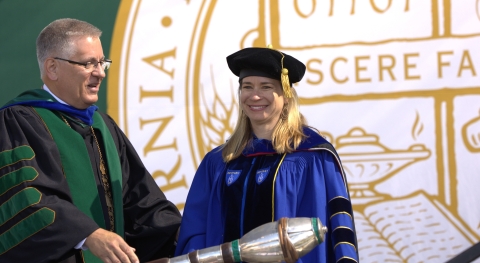
“You hope that the company you’ve hired to go skydiving has controls in place,” she says.
The same is true with publicly traded companies, she says, where appropriate checks and balances will minimize risk of undesired results, like significant errors or fraud. Except instead of skydivers and pilots, you have accountants, controllers and auditors.
“The goal of the exercise is to make a concept that would otherwise be difficult to understand very intuitive,” Westermann explained later.
Westermann’s teaching was recognized during the 2025 spring commencement, when she was honored as one of three educators university-wide to win a Distinguished Teaching Award. Nominations for the award are submitted by students and alumni. Then, a committee of faculty members evaluate the nominees based on written documentation and in-class visitations.
For Westermann, committee members attended her Accounting Ethics and Financial Statement Auditing classes.
While an accounting career might have been a natural path for the child of two accounting grads, it took a brief detour as a bartender to lead her toward teaching.
Westermann grew up in Anaheim Hills. After hearing stories about accounting from her father, who worked as a controller, and her grandfather, who had a tax practice, she followed the family trade and pursued accounting at Cal Poly, where she also played on the tennis team for a season. After graduation, she began working for Big Four firms in San Jose and New York City. But after two years at PwC in New York, she was burnt out. So she took an unpaid leave and pursued something completely different.
“When you’re in your twenties, and you live in New York, and you’re single, and you have money, and you’re going out on weekends, bartenders look like they’re having fun,” she said. “And when you’re stressed out at your day job, why not?”
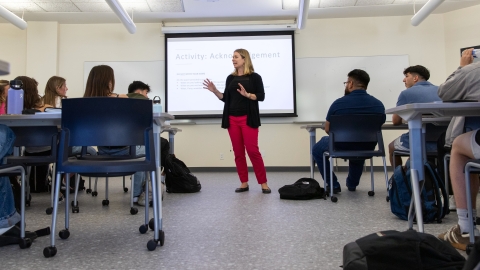
Bartending proved to have its own stressors, however, and Westermann returned to PwC -- this time in a new role with the Learning and Education area.
There she discovered a passion for teaching.
Eventually, she earned a doctorate in accountancy from Bentley University in Massachusetts. After teaching as a visiting scholar in Australia and then as an assistant professor at Florida International University, she returned to her alma mater, where she designed an ethics class she developed while spending a month at Aarhus University in Denmark.
“Ethics is the foundation of accounting,” said Westermann, a certified public accountant.
While the stereotype portrays the accounting job as a numbers-oriented desk job, the profession is uniquely connected to money, offering criminal and unethical opportunities other careers don’t. For that reason, Hollywood often features accounting characters in action-packed films, usually as criminals (“Midnight Run”) or those trying to thwart them (“The Untouchables”).
“Fraud is about opportunity, rationalization, and incentive,” she said. “And so we talk about fraud.”
Westermann has students explore real high-profile financial crimes, including those at Enron, Theranos, Bernard L. Madoff Investment Securities and FTX, among others, but she also has students research lower-profile local cases, including elementary school and local embezzlements.
Westermann also assigns a book, “The (Honest) Truth About Dishonesty: How We Lie to Everyone -- Especially Ourselves,” by Dan Ariely, which looks at cheating and dishonesty, and one exercise she assigns has students note the lies they have recently told as a means of self-reflection.
“There’s not a one-size-fits-all case for fraud, but when the students come out of class, they have a heightened awareness about all the different reasons for it,” she said. “When and why people cheat.”
Organizational controls, she said, help discourage and detect unethical practices.
"Ethics is the foundation of accounting."
Kim Westermann
“If you’re going to be an auditor, part of your job is to have a healthy, professional skepticism,” she said. “If you’re an accountant, your job is to prepare the financial statements accurately – not what management wants them to look like, but the economic reality of the company.”
Westermann has also received nationally recognized awards from her academic research, which has included publications on how accountants learn their trade, challenges to global group audits, and how the Public Company Accounting Oversight Board (PCAOB) inspections process unfolds. A paper she is currently working on looks at alcohol use – and the pressures to drink with co-workers -- in the accounting profession.
“The data suggests that people who don’t drink are seen as outsiders” she said.
Westermann brings that thought leadership to her classrooms to share new, relevant trends.
“It also shows students that research can be engaging, interesting and fun,” said Westermann, who also serves as an advisor to the Cal Poly Accounting Club.
Accounting colleague Tad Miller, who won the Distinguished Teaching Award in 2008, said Westermann’s qualitative research has provided extensive contact with professional auditors.
“As a result of her research, she has interacted with leaders at the highest levels of the auditing profession and their regulators,” he said. “Having these types of experiences to share with students is highly unusual and invaluable.”
Despite her skydiving scenario, Westermann has never actually gone skydiving, though she has bungee jumped 216 meters off of Bloukrans Bridge in South Africa.
A frequent traveler, she has traveled to Asia, Africa, Australia, South America and Europe.
“I think it makes me a much more empathetic person,” she said.
By supporting our faculty, you can help provide our accounting students with the tools needed to succeed in their careers.

